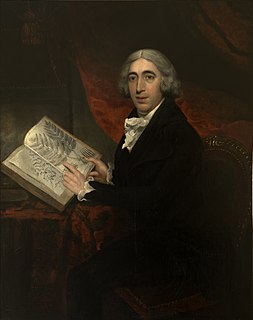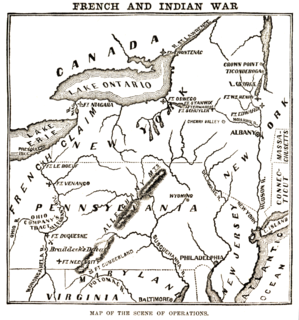Related Research Articles

1759 (MDCCLIX) was a common year starting on Monday of the Gregorian calendar and a common year starting on Friday of the Julian calendar, the 1759th year of the Common Era (CE) and Anno Domini (AD) designations, the 759th year of the 2nd millennium, the 59th year of the 18th century, and the 10th and last year of the 1750s decade. As of the start of 1759, the Gregorian calendar was 11 days ahead of the Julian calendar, which remained in localized use until 1923.

Charles Edward Louis John Casimir Sylvester Severino Maria Stuart was the elder son of James Francis Edward Stuart, grandson of James II and VII, and the Stuart claimant to the throne of Great Britain after 1766 as "Charles III". During his lifetime, he was also known as "the Young Pretender" and "the Young Chevalier"; in popular memory, he is "Bonnie Prince Charlie". He is best remembered for his role in the 1745 rising; his defeat at Culloden in April 1746 effectively ended the Stuart cause, and subsequent attempts failed to materialise, such as a planned French invasion in 1759. His escape from Scotland after the uprising led to his portrayal as a romantic figure of heroic failure.

Sir James Edward Smith was an English botanist and founder of the Linnean Society.

The 1759 Battle of Ticonderoga was a minor confrontation at Fort Carillon on July 26 and 27, 1759, during the French and Indian War. A British military force of more than 11,000 men under the command of General Sir Jeffery Amherst moved artillery to high ground overlooking the fort, which was defended by a garrison of 400 Frenchmen under the command of Brigadier General François-Charles de Bourlamaque.

The Battle of Quiberon Bay was a decisive naval engagement during the Seven Years' War. It was fought on 20 November 1759 between the Royal Navy and the French Navy in Quiberon Bay, off the coast of France near St. Nazaire. The battle was the culmination of British efforts to eliminate French naval superiority, which could have given the French the ability to carry out their planned invasion of Great Britain. A British fleet of 24 ships of the line under Sir Edward Hawke tracked down and engaged a French fleet of 21 ships of the line under Marshal de Conflans. After hard fighting, the British fleet sank or ran aground six French ships, captured one and scattered the rest, giving the Royal Navy one of its greatest victories, and ending the threat of French invasion for good.

Alexander James Dallas was an American statesman who served as the 6th United States Secretary of the Treasury from 1814 to 1816 under President James Madison.
Spy was a satirical monthly magazine published from 1986 to 1998. Based in New York City, the magazine was founded by Kurt Andersen and E. Graydon Carter, who served as its first editors, and Thomas L. Phillips Jr., its first publisher. Spy specialized in irreverent and satirical pieces targeting the American media and entertainment industries and mocking high society.
The Scots Magazine is a magazine containing articles on subjects of Scottish interest. It claims to be the oldest magazine in the world still in publication, although there have been several gaps in its publication history. It has reported on events from the defeat of the Jacobites through the Napoleonic wars to the Second World War and on to the creation of the new Scottish Parliament.

The London Chronicle was an early family newspaper of Georgian London. It was a thrice-a-week evening paper, introduced in 1756, and contained world and national news, and coverage of artistic, literary, and theatrical events in the capital.
Andrew Burnaby was an English clergyman and travel writer, mainly about the American colonies and Italy.

William Playfair, a Scottish engineer and political economist, served as a secret agent on behalf of Great Britain during its war with France. The founder of graphical methods of statistics, Playfair invented several types of diagrams: in 1786 the line, area and bar chart of economic data, and in 1801 the pie chart and circle graph, used to show part-whole relations. As secret agent, Playfair reported on the French Revolution and organized a clandestine counterfeiting operation in 1793 to collapse the French currency.

The Philosophical Magazine is one of the oldest scientific journals published in English. It was established by Alexander Tilloch in 1798; in 1822 Richard Taylor became joint editor and it has been published continuously by Taylor & Francis ever since.
Events from the year 1833 in the United Kingdom.
Events from the year 1817 in the United Kingdom.
The 109th (Aberdeenshire) Regiment of Foot was an infantry regiment of the British Army from 1794 to 1795. Raised by Alexander Leith Hay for service in the French Revolutionary Wars the regiment was briefly deployed in Jersey before it was disbanded in England and its men sent to reinforce the 53rd (Shropshire) Regiment of Foot. The disbandment was controversial as Leith-Hay believed it contravened an assurance given to him in his original letter of service to raise the regiment.
William Rider was an English historian, priest and writer. Whilst he wrote a number of works, his New Universal Dictionary suffered in comparison with that written by Samuel Johnson and his 50-volume work A New History of England was unsuccessful; it was later described as one of the vilest Grub Street compilations ever published. He was a chaplain and master at St Paul's School for many years, as well as being associated with the Mercers' Company and churches in the City of London.
Philippa Perry is a British psychotherapist and author. She has written the graphic novel, Couch Fiction: A Graphic Tale of Psychotherapy (2010), How to Stay Sane (2012) and The Book You Wish Your Parents Had Read (2019).

Christian Felix Weiße (1726–1804) was a German writer and pedagogue. Weiße was among the leading representatives of the Enlightenment in Germany and is regarded as the founder of German children's literature.
Robert Towerson Cory was an English churchman and Professor of moral philosophy at the University of Cambridge.
References
- 1 2 "British Periodicals Collections I and II". Reviews in History. Retrieved 25 July 2015.